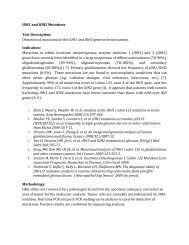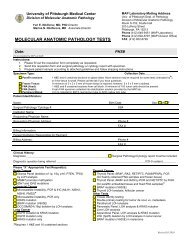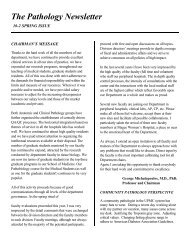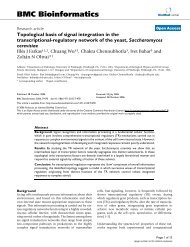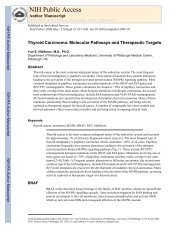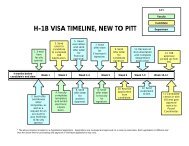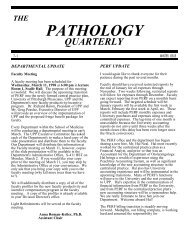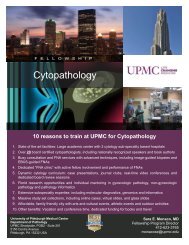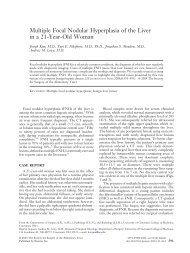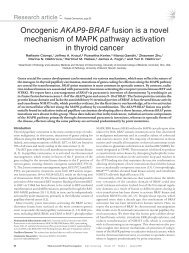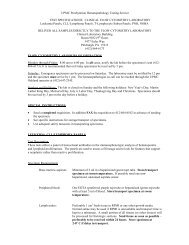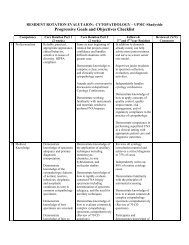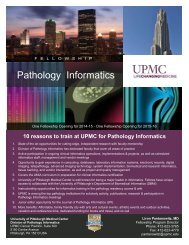- Page 1 and 2: DIVISION OF HEMATOPATHOLOGY HEMATOP
- Page 3 and 4: TABLE OF CONTENTS (cont.) LYMPH NOD
- Page 5 and 6: HEMATOPATHOLOGY FACULTY Long Range
- Page 7 and 8: General Outline for Hematopathology
- Page 9: General/Special Hematology Laborato
- Page 13 and 14: Competency Core Rotation - 1st to 3
- Page 15 and 16: Competency Core Rotation - 1st to 3
- Page 17 and 18: Competency Core Rotation - 1st to 3
- Page 19 and 20: CONFERENCE SCHEDULE AND RESPONSIBIL
- Page 21 and 22: RESIDENT AND FELLOW CONFERENCE RESP
- Page 23 and 24: y the faculty member. Case presenta
- Page 25 and 26: Additional information regarding Sh
- Page 27 and 28: Pediatric Hematopathology and Gener
- Page 29 and 30: General/Special Hematology Experien
- Page 31 and 32: General Hematology Laboratory (ATL)
- Page 33 and 34: QC/QA Procedures, graphing Running
- Page 35 and 36: • Test of RBC function Know how t
- Page 37 and 38: HEMOGLOBIN ANALYSIS CASE LOG ACCESS
- Page 39 and 40: PB AND FLUID REVIEW LOG ACCESSION N
- Page 41 and 42: Pediatric Hematopathology Checklist
- Page 43 and 44: Diamond Blackfan Syndrome Congenita
- Page 45 and 46: Drugs/toxins Infection-associated T
- Page 47 and 48: PRESENTED THE FOLLOWING PEDIATRIC B
- Page 49 and 50: UPMC PRESBYTERIAN SHADYSIDE Automat
- Page 51 and 52: Clinical Experience in Hematology
- Page 53 and 54: Performance of Bone Marrow Aspirati
- Page 55 and 56: 1. 2. 3. 4. 5. 6. 7. 8. 9. 10. HEMA
- Page 57 and 58: Flow Cytometry Laboratory Experienc
- Page 59 and 60: Chronic leukemia Hairy Cell Leukemi
- Page 61 and 62:
MDS / Cytopenia Panel (BM and PB) F
- Page 63 and 64:
Mini (T) Acute Lymphoblastic Leukem
- Page 65 and 66:
Validated Extra Tubes: FITC PE PerC
- Page 67 and 68:
FITC PE PerCP PerCP- CY5.5 X PE- Cy
- Page 69 and 70:
of the results, or the morphologic
- Page 71 and 72:
TEST SPECIFICATIONS: CLINICAL FLOW
- Page 73 and 74:
ICD9 Codes for Flow A list of ICD9
- Page 75 and 76:
Adult Bone Marrow Experience (~4 we
- Page 77 and 78:
7. In consultation with staff patho
- Page 79 and 80:
IV. Quality assurance is very impor
- Page 81 and 82:
APPENDIX C LOCATION OF BONE MARROW
- Page 83 and 84:
ADULT BONE MARROW SERVICE REQUEST F
- Page 85 and 86:
Promyel ___________% __________(ABS
- Page 87 and 88:
ADULT BONE MARROW WORKSHEET INSIDE
- Page 89 and 90:
Plasma Cells _____________% 2.0 ( 0
- Page 91 and 92:
DAY 14 BONE MARROW WORKSHEET Techno
- Page 93 and 94:
Blasts _________% __________(ABS) P
- Page 95 and 96:
Case number:_______________________
- Page 97 and 98:
Surgical Pathology Cancer Case Summ
- Page 99 and 100:
___ Acute myelomonocytic leukemia _
- Page 101 and 102:
___ Classical Hodgkin lymphoma type
- Page 103 and 104:
Explanatory Notes A. Specimen Compl
- Page 105 and 106:
Hemoglobin less than 8.5 g/dL (85 g
- Page 107 and 108:
6. Lymphoid neoplasms. In: Edge SB,
- Page 109 and 110:
TEST SPECIFICATIONS: BONE MARROW LA
- Page 111 and 112:
Summary of Test Specifications for
- Page 113 and 114:
AFTER-HOURS PROCEDURES (CHILDREN’
- Page 115 and 116:
6. Cytogenetics: Monday through Th
- Page 117 and 118:
Lymph Node Pathology Experience (~4
- Page 119 and 120:
(Warning: Formalin is a suspected c
- Page 121 and 122:
6.8 Cut a small paper thin slice, p
- Page 123 and 124:
6.13.2 Fresh tissue for special lab
- Page 125 and 126:
How to handle very small specimens
- Page 127 and 128:
Surgical Pathology Manual: Spleen P
- Page 129 and 130:
Policy for solid tissue specimens s
- Page 131 and 132:
Fresh Case Lymph Nodes and Other So
- Page 133 and 134:
RULES FOR HISTOLOGY All exceptions
- Page 135 and 136:
All recuts, special stains, and imm
- Page 137 and 138:
EXAMPLE: Consult material descripti
- Page 139 and 140:
For multiple parts with one or more
- Page 141 and 142:
CLINICAL HISTORY In the clinic
- Page 143 and 144:
6.2.3 Determine if any slides that
- Page 145 and 146:
J chain AJ BCL2 ABCL2 BCL2 E17 ABCL
- Page 147 and 148:
MOLECULAR DNA/RNA (Already Stored)
- Page 149 and 150:
Lymph Node Rotation Checklist Note:
- Page 151 and 152:
Diagnosis / Finding Observed Actual
- Page 153 and 154:
Diagnosis / Finding Observed Actual
- Page 155 and 156:
Angiosarcomas Nonvascular sarcom
- Page 157 and 158:
UTILIZED THE FOLLOWING LYMPH NODE R
- Page 159 and 160:
Surgical Pathology Cancer Case Summ
- Page 161 and 162:
Lymphomatoid papulosis Primary cuta
- Page 163 and 164:
Explanatory Notes A. Specimen Any n
- Page 165 and 166:
### The number of lymph node region
- Page 167 and 168:
Hairy Cell Leukemia: sIG+ (IGM, IGD
- Page 169 and 170:
t(8;22)(q24;q11); rearranged MYC ge
- Page 171 and 172:
F. Clinical Prognostic Factors and
- Page 173 and 174:
33. Osterman B, Cavallin-Stahl E, H
- Page 175 and 176:
where the differential diagnosis in
- Page 177 and 178:
Immunophenotypes 1,4-8 The followin
- Page 179 and 180:
Immunohistochemistry
- Page 181 and 182:
2. If you are ordering the panel us
- Page 183 and 184:
CD57 (Leu 7) ALEU7 NK-cells, Neural
- Page 185 and 186:
Complete Immunohistochemical Stain
- Page 187 and 188:
CD5 CD5 CD56 CD56 CD57 CD57 CD61 CD
- Page 189 and 190:
HHV8 HMB45 Melanoma HPV Papilloma V
- Page 191 and 192:
P501S P504S P53 Tumor Suppressor Pr
- Page 193 and 194:
CODES FOR DOUBLE LABELING ICKDE AE1
- Page 195 and 196:
PHS/B:______________________ PARAFF
- Page 197:
Molecular Diagnostic and Cytogeneti
- Page 200:
PITTSBURGH CYTOGENETICS LABORATORY
- Page 204 and 205:
FISH panels for Hematologic Maligna
- Page 206 and 207:
CML Strategy ES probe 1. BCR/ABL ES
- Page 208 and 209:
COPATH Related Instructions for Dic
- Page 210 and 211:
Division of Hematopathology Dictati
- Page 212 and 213:
Wording for Provisional Reports on
- Page 214 and 215:
Bone Marrow/Peripheral Blood Hemato
- Page 216 and 217:
Bone Marrow/Peripheral Blood Hemato
- Page 218 and 219:
Bone Marrow/Peripheral Blood Hemato
- Page 220 and 221:
Bone Marrow/Peripheral Blood Hemato
- Page 222 and 223:
Non-Hodgkins Lymphoma Biopsy/Resect
- Page 224 and 225:
Non-Hodgkins Lymphoma Biopsy/Resect
- Page 226 and 227:
Non-Hodgkins Lymphoma Biopsy/Resect
- Page 228 and 229:
Hodgkin Lymphoma Biopsy/Staging Syn
- Page 230 and 231:
Web-Based Resources
- Page 232:
Educational Site 1. http://www.cyto



